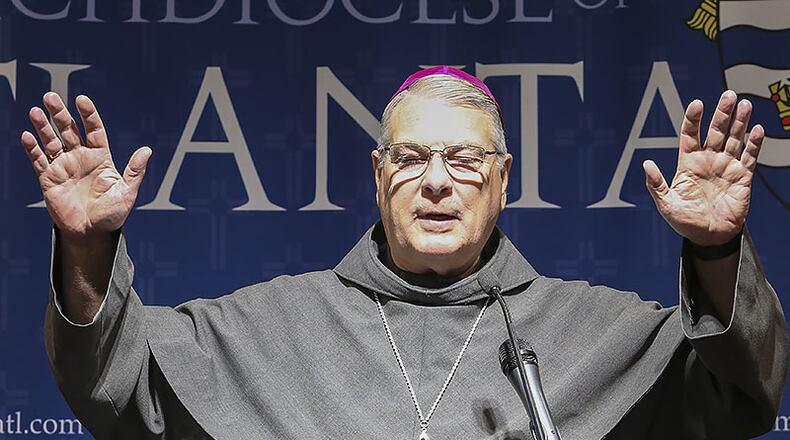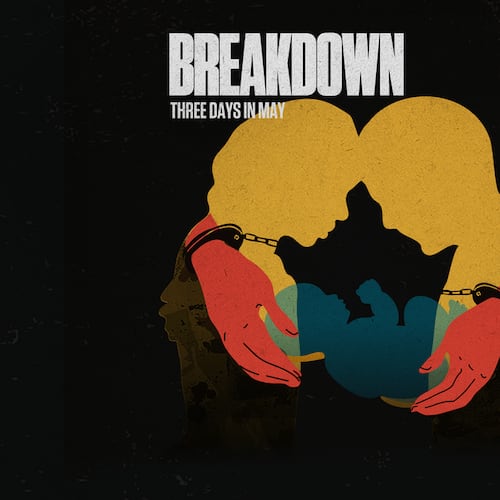Atlanta Archbishop Gregory J. Hartmayer has instructed priests to not sign letters from parishioners requesting a general religious exemption from getting the COVID-19 vaccine.
In an excerpt from a memo sent. Aug. 13, Hartmayer writes that based on the Congregation for the Doctrine of the Faith, the church body responsible for defending morals and the Catholic doctrine, it is “morally acceptable” to receive the vaccine. ”…from the ethical point of view, the morality of vaccination depends not only on the duty to protect one’s own health, but also on the duty to pursue the common good,” the Congregation goes on to say. “In the absence of other means to stop or even prevent the epidemic, the common good may recommend vaccination, especially to protect the weakest and most exposed.”
Because of that determination, “the church cannot provide a general exemption,” said Hartmayer, who is vaccinated and has encouraged parishioners and others to get the COVID-19 vaccine.
The excerpt was provided to The Atlanta Journal-Constitution by the office of communications.
There has been a great deal of hesitancy about getting the vaccine among many in Georgia, which has seen an alarming uptick in hospitalizations, largely from people who are unvaccinated. The tsunami of the sick, fueled by the highly-contagious delta variant, has taxed the state’s health care system and hospital staffs.
Some people decide not to take vaccines, claiming it violates aspects of their religious beliefs. One of the issues, they say, is concern about the use of tissue or cell lines from fetuses aborted decades ago.
Last year, the U.S. Conference of Catholic Bishops Committee on Pro-Life Activities and the Committee on Doctrine said that neither the Pfizer nor Moderna coronavirus vaccines — the first two vaccines that were made available to the public — “used morally compromised cell lines in the design, development, or production of the vaccine.”
The USCCBC said a confirmatory test using a “morally compromised” cell line was performed on both vaccines, but “in this case the connection is very remote from the initial evil of the abortion.”
On Friday, the state passed a somber milestone, more than 20,000 Georgia deaths from the virus, according to the Georgia Department of Public Health.
Some Georgia businesses, local governments and places of worship are requiring employees and members to be vaccinated. Some restaurants and arts venues are also requiring proof of vaccination from diners and attendees. Metro Atlanta’s largest private colleges and universities, including Atlanta’s HBCUs, are also requiring students, faculty and staff be vaccinated to be on campus this semester.
Some organizations are considering medical and religious exemptions to getting the vaccine from their employees, students and guests.
People can can seek a personal exemption but they will have to do so without a signature from the church, according to the communications office.
Last month Pope Francis, appeared in a video for the nonprofit Ad Council and the COVID Collaborative that advocated for people to get the vaccine.
“Thanks to God’s grace and to the work of many, we now have vaccines to protect us from COVID-19,” the pope said in the message, according to Reuters.
“They grant us the hope of ending the pandemic, but only if they are available to all and if we work together, the pope said.
Some Georgia businesses that have mandated vaccines for employees also have consequences ranging from termination to financial penalties.
An August survey by the firm of Willis Towers Watson found that more companies plan to have vaccine mandates by the fourth quarter of 2021.
Willis Towers Watson, a global advisory, broking and solutions company. reported that 52 % of employers could have one or more vaccine mandates in the workplace.
Delta Air Lines, for example, which requires new hires to get vaccinated, plans to charge unvaccinated employees an extra $200 a month beginning in November as part of the company’s health care plans.
The Atlanta-based carrier will also require unvaccinated employees to be tested weekly for the coronavirus starting Sept. 12 while cases are high.
A spokesman for Delta said the company will consider religious exemptions and expects to provide more detail about that process in the weeks ahead.
About the Author
Keep Reading
The Latest
Featured



